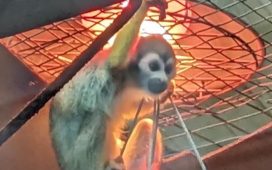“Thou aeronautical boll weevil / Illuminate yon woods primeval,” the Mills Brothers sang in 1952, imploring glow-worms to “Light the path below, above / And lead us on to love”. John Keats, comparing the fairness of goddess Psyche with the bright white moon and the evening star (spoiler: she is fairer than both), refers to the star as an “amorous glow-worm of the sky”. Seamus Heaney poked a glow-worm with a blunt stick and “a tiny brightening den lit the eye” – turning the stick into a wand.
Bibbidi-bobbidi-boo. I’m in Mozambique, it is dark, and there is a wedding tomorrow. I have just had my first – and I don’t know it yet, but only – drink in a coconut. I chose Fanta Grape. Outside at the restaurant, I see my first glow-worms. It is possible that they are fireflies, but they’re still: on the branches of what I hope are hibiscus trees, but then again, I would happily plant a hibiscus in every memory I have.
I had read about them in James and the Giant Peach. The centipede tells James, “Glow-worms are never worms. They are simply lady fireflies without wings.”
“Never worms” is what they are like; you’re not sure of what you’ve seen, they pulse so strangely and each configuration of lit-up worms is so different from the last – so unlike stars, or fairy lights or candles. As soon as you think you’ve seen them, they blink off. As soon as you’re sure you imagined them, on they go again.
The peach in the film version of Dahl’s book – like the biscuits eaten by the mice in The Aristocats – was an unattainably delicious thing. The best peach you could possibly imagine, and would never quite manage to eat.
The glow-worms were different; they were better in real life. “Glow-worms sell themselves,” a friend said to me when she sent me the Mills Brothers song. And they do. But nonetheless: let’s turn on the light.
Glow-worms are, of course, quite ugly. And being insects, their lives are harrowing and strange in the way only insects’ lives can be. Europe’s common glow-worm injects poison into slugs and snails, liquifying the – why yes, I am prepared to use this term – slug/snail meat. Wikipedia describes it as a “brown broth that the larva can lap up”. The poison doesn’t kill the prey, and sometimes they just slide away, which reminds me of lines from Gus Ferguson’s Chanson: “we heave our heavy portmanteaux / that hold dark secrets none should know / and which is why we go so slow / along the Rue d’Escargot.”
In New Zealand, there are caves filled with glow-worms patrolling thin strings of goo decorated with fine droplets. These droplets catch midges, which the glow-worms eat. They need to eat a lot, because the glow-worms eventually transform into “primitive flies” – fungus gnats – whose mouth parts don’t function, which means they are unable to eat anything at all. The flies are a kind of purgatory stage of the insect – a hungry ghost, a lost soul – and then they mate and enter the afterlife. (Fireflies are more romantic. In Mexico, they search for mates on moonless nights before rainy days. These precise conditions occur for just a few hours each year).
Glow-worms, fireflies and lightning bugs remind me of thinking, memory and writing. There is the way an idea will appear seemingly by itself, and vanish if you don’t record it. The jump from one scene in your mind to another that “can communicate before it is understood”. The glow-worms laying down their sticky traps: early sentences ready to catch the perfect word – a gnat suspended in a droplet – to reel it in, chew it up, and start again. Is there another gnat, a better gnat? Don’t let it slip away. As the Mills brothers sing: “Shine little glow-worm, glimmer, glimmer / Hey there, don’t get dimmer, dimmer.”
And yes, desire and distraction. All the glow-worms in England – “Ye country comets, that portend / No war nor prince’s funeral” – couldn’t help a lovestruck Andrew Marvell 400 years ago. “Your courteous lights in vain you waste, / Since Juliana here is come, / For she my mind hath so displac’d / That I shall never find my home.”
“The Nature of … ” is a column by Helen Sullivan dedicated to interesting animals, insects, plants and natural phenomena. Is there an intriguing creature or particularly lively plant you think would delight our readers? Let us know on Twitter @helenrsullivan or via email: helen.sullivan@theguardian.com














